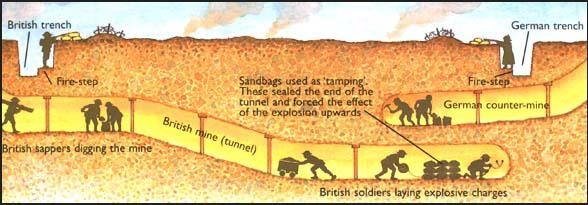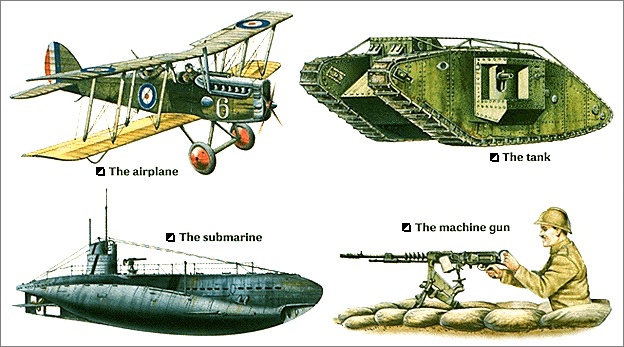First World War – Outbreak, Course & End
by Devender
0 1971
The incidents that started the war were not much if Europe was not already divided into two different parts that were preparing for war for many years.
Outbreak of First World War
On 28th June 1914, Archduke Francis Ferdinand, who was heir to the throne of Austria-Hungary was assassinated in Sarajevo, capital of Bosnia. Austria believed that Serbia was behind it and gave it an ultimatum.

- Serbia refused to accept one term in the ultimatum as it was against their independence
- Austria declared war on Serbia on 28th July 1914
- Russia supported Serbia and started preparing for battle
- On 1st August, Germany declared war against Russia, and on 3rd August, against France
- German troops marched in Belgium to start a war on France
- The same day Britain declared war on Germany
- Soon, many other countries entered the war
- Japan entered the war against Germany with a goal to capture German colonies in the far west
- Bulgaria and Turkey entered the war from the German side
- Italy was a member of the Triple Alliance but it still remained idle for some time and later in 1915, Italy joined the war against Germany
Course of First World War
Germany aimed to attack France through Belgium, they planned to defeat France within 6 weeks and then moved to Russia. This was Schlieffen Plan.
- This plan seemed to work fine for a while and the German army was able to enter 20 km into Paris
- Russia started an attack on Germany and Austria due to which some German troops had to divert to the eastern front
- German advance of France came to a stop
- At this time, the war spread all over the world, and battles were fought in Asia, Africa, and the Far East
- Trench Warfare:
- On the western front, the warring sides dug trenches and continued attacking each other
- Neither sides were able to upset the other for nearly 4 years
- These warring countries also brought soldiers from their respective colonies
- Labors from Colonies were also used to dig trenches
- On the western front, Germany and Austria were able to defeat Russia and captured parts of the Russian Empire
- They also successfully repelled Rumania, Serbia, and Italy
- New weapons used in war:
- Britishers introduced the use of tanks in the war which became a major weapon later
- Both warring sides tried to disrupt each other's food supplies, arms supplies, and manufacturing goods
- Submarines which were called UBoats were extensively being used by German forces to destroy enemy ships
- Germany destroyed any ship heading towards Britain
- Withdrawal of Russia:
- Russian Empire suffered major losses in the war
- The new government proposed peace with the end of the war
- Russia withdrew from the war and signed a peace treaty with Germany in March 1918
- Entry of USA:
- America entered the war against Germany on 6th April 1917
- The USA became the main source of Arms and other essential supplies
- Americans also feared that if Germany won the war, then it will become a rival of America
- The countries fighting against Germany raised huge amounts of loans in the USA to pay for the arms and other goods bought by them
- At the start of the year 1917, a few socialist parties tried to induce an International socialist conference to end the war but the conference never happened
- The new Bolshevik government in Russia proposal to conclude war was liked by a lot of people in different countries but it was still rejected by countries
- The Pope also intervened and made proposals to end the war but nobody took them seriously
- Surrender of Germany and Austria-Hungary:
- In September, Bulgaria withdrew from the war
- In October, Turkey surrendered
- Political discontent rose between Austria-Hungary and Germany
- In November, the emperor of Austria-Hungary also surrendered
- Revolution broke out in Germany
After the German advancement halted, new warfare came into existence where armies dug trenches and used them to conduct raids on opponents. The stay in open and fight kind of warfare almost disappeared after this.

Japan occupied colonies of Germany in East Asia and Britain & France took most of the German colonies in Africa.
A large number of weapons were developed during this time, Machine Gun and Liquid Fire were such two weapons. For the first time in history, aircraft were being used in war. They were also used for bombing civilian areas.

One of the worst weapons that were used in the war was poison gas.
In 1917, Russia withdrew from the world war after October Revolution. Russian revolutionaries were against the war from the beginning and under the new leadership of Lenin, they saw the opportunity to start a revolutionary war to end Russian autocracy and seize power.
Powers in Russia that were against the revolution and wanted war started armed intervention. It started a civil war in Russia that lasted for 3 years and ended with the defeat of people who were against the new revolutionary government.
In 1915, German U-boats sunk a British ship that was carrying 1153 passengers, all dead among which 128 were American. America was always sympathetic towards Britain and after the incident, America was totally against Germany.
Many Americans took these loans as these are only to be paid once and only when if these countries emerge on the winning side of the war.
End of First World War
A lot of efforts were made to end this war.
All these efforts went into vain because no government of warring countries was ready to back down. This grew anti-war feelings in people, Mutinies & disturbances began to spread in many countries, and in some countries after the success of the Russian revolution, people tried to overthrow the government.
The President of the USA also proposed a peace treaty to end the war which is known as President Wilson’s Fourteen Points. Some of these points were accepted when peace treaties were signed after the end of the war.
A military offensive was launched on July 19188 by the USA, Britain, and France which resulted in collapsing of Germany and its allies.
This all led to the inevitable, end of the war. Germany became a republic and the German emperor Kaiser William II fled to Holland. On 11th November 1918, the new German government signed an Armistice and the war was finally over.

Share:







Comments
Waiting for your comments